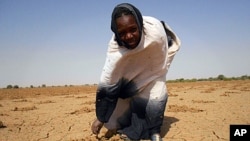Aid agencies are again warning of another food crisis in Africa's Sahel region. The consequences of last year’s scant rains and exceptionally poor harvest are now being harvested in northern Senegal. The Red Cross says more than 800,000 people in seven regions are at risk of severe food insecurity and it doesn’t have enough funds to address the situation.
Cheikh Seye Dienj, the Red Cross coordinator in St. Louis, says surveys and interviews with some 800 families in villages across three regions - St. Louis, Dagama and Podor - show the situation is heading towards the crisis point.
Human toll
Dienj says the wells have dried up and people don't have enough water for their fruits and vegetables. He says families are now selling their belongings to survive.
On the approach to the village of Ndoye Diagne, 17 kilometers outside the northern town of St. Louis, bright green patches of cabbages and onions can been seen growing amid the otherwise arid landscape. These vegetables are the only crops hardy enough to grow in the dry conditions.
When asked if they have enough to feed their children, the women weeding these tiny vegetable patches and drawing water from the few wells that remain, laugh and shake their heads.
Mamadou Diagne, the Red Cross representative in this village of 36 families, says the problems are compounded because villagers are being priced out of the market by cheap, imported onions. When imported onions are sold at market, the price of local onions falls from 40 cents per kilo to 15 cents per kilo.
He says there are even some of us who have sold off our animals to make some money and get seeds and materials, and aid agencies have given us grain and a few seeds.
But Diagne says the villagers are getting by for now.
"We go to the market and we sell our animals, he says, so that we can buy a little bit of oil, sugar, rice, that kind of thing, and manage the situation. It is all we can do," said Diagne. "We need food - and we need to reconstruct our wells so that we can grow vegetables again."
The Red Cross says is does not have enough funds to reconstruct all the wells, which each cost around $100 to build.
No government help
Meanwhile the Senegalese government - preoccupied with the controversial presidential elections later this month - appears not to be focused on the situation.
Villagers say they have received no government help and many people in the country are not aware of the crisis brewing in the north.
Amadou Fall Canar Diop, from the government’s Civil Protection Unit, says the government is preparing a plan and will react soon.
In the village of Kalasan, 13 kilometers from St. Louis, villager and Red Cross representative Arona Gueye is the father and grandfather of 10 children.
He says the price for rice alone has gone up 50 percent, and villagers are now forced to borrow sugar, rice, tea and other basic products to feed their families.
"Absolutely nothing of last year’s harvest remains," says Gueye. "It’s all gone. We will get loans to survive. He says local merchants will lend them things like sugar and rice and they will somehow repay them after this year’s harvest."
Some villagers are leaving for the cities to try to make cash, while others sell wood and charcoal to survive.
The United Nations in January warned that the international community should not wait until people are starving to act. The U.N. Special Rapporteur on the right to food, Olivier De Schutter, said cash is needed in the short term, but donors must ensure that food reserves are pre-positioned in risk prone regions.
Countries affected by the looming food crisis, besides Senegal, are Chad, Mali, Mauritania, Niger and Burkina Faso.
Aid Group Warns Sahel Once Again Facing Food Crisis
- By Jane Labous













